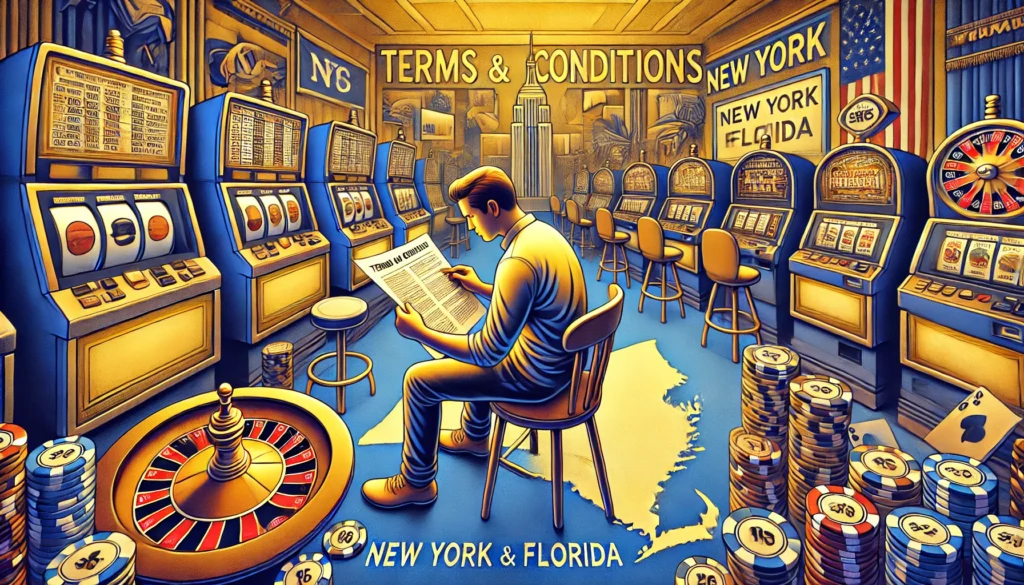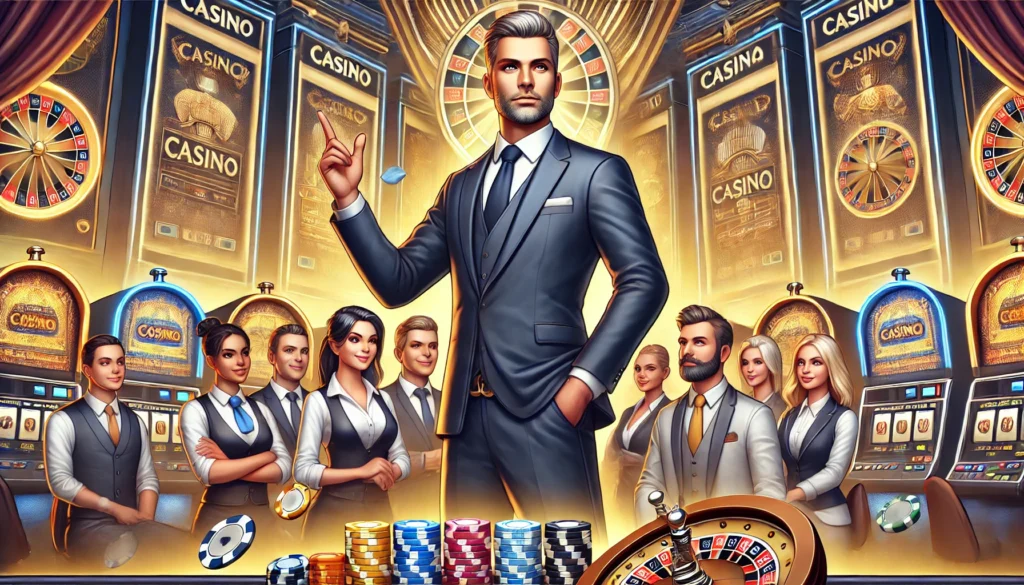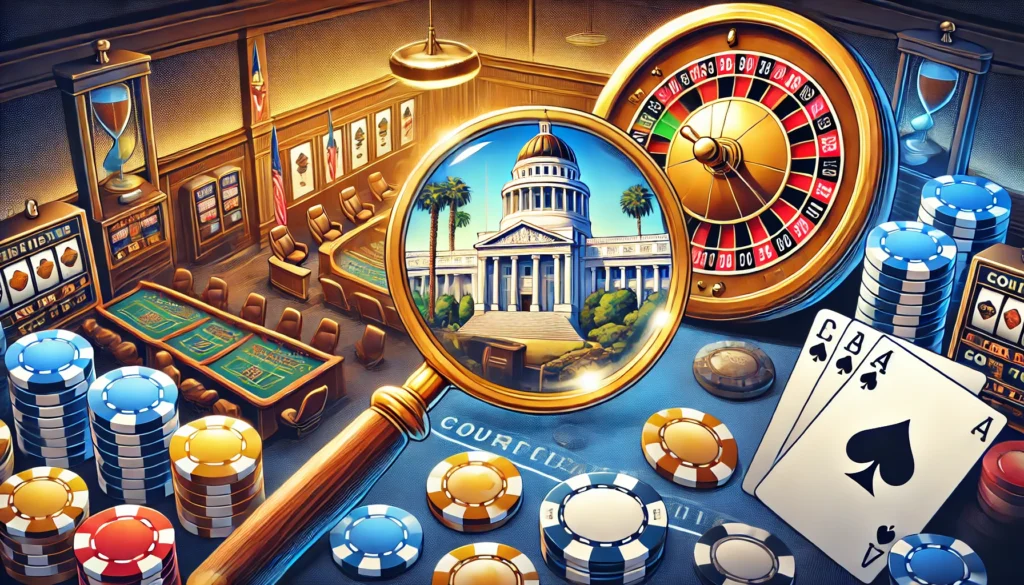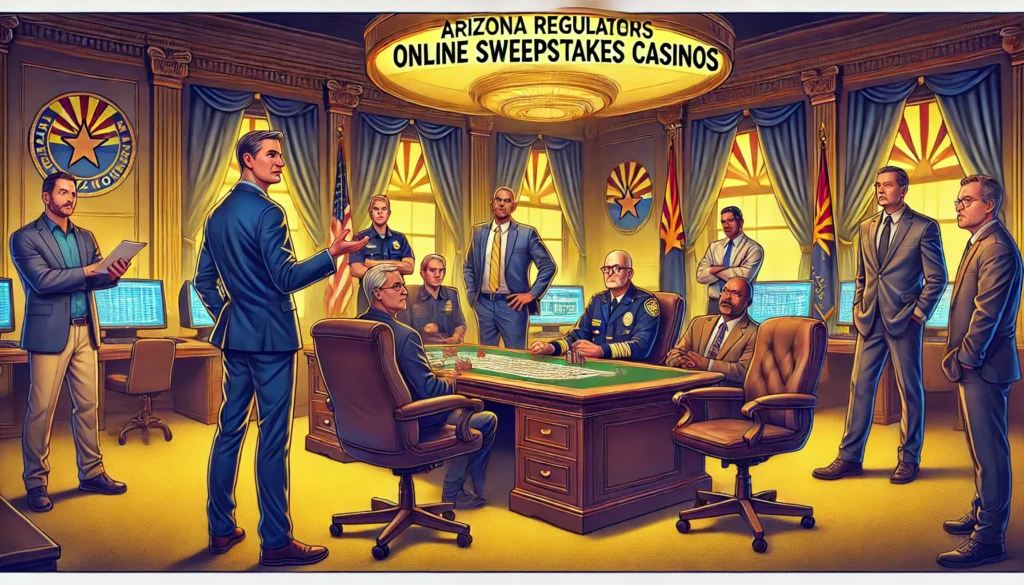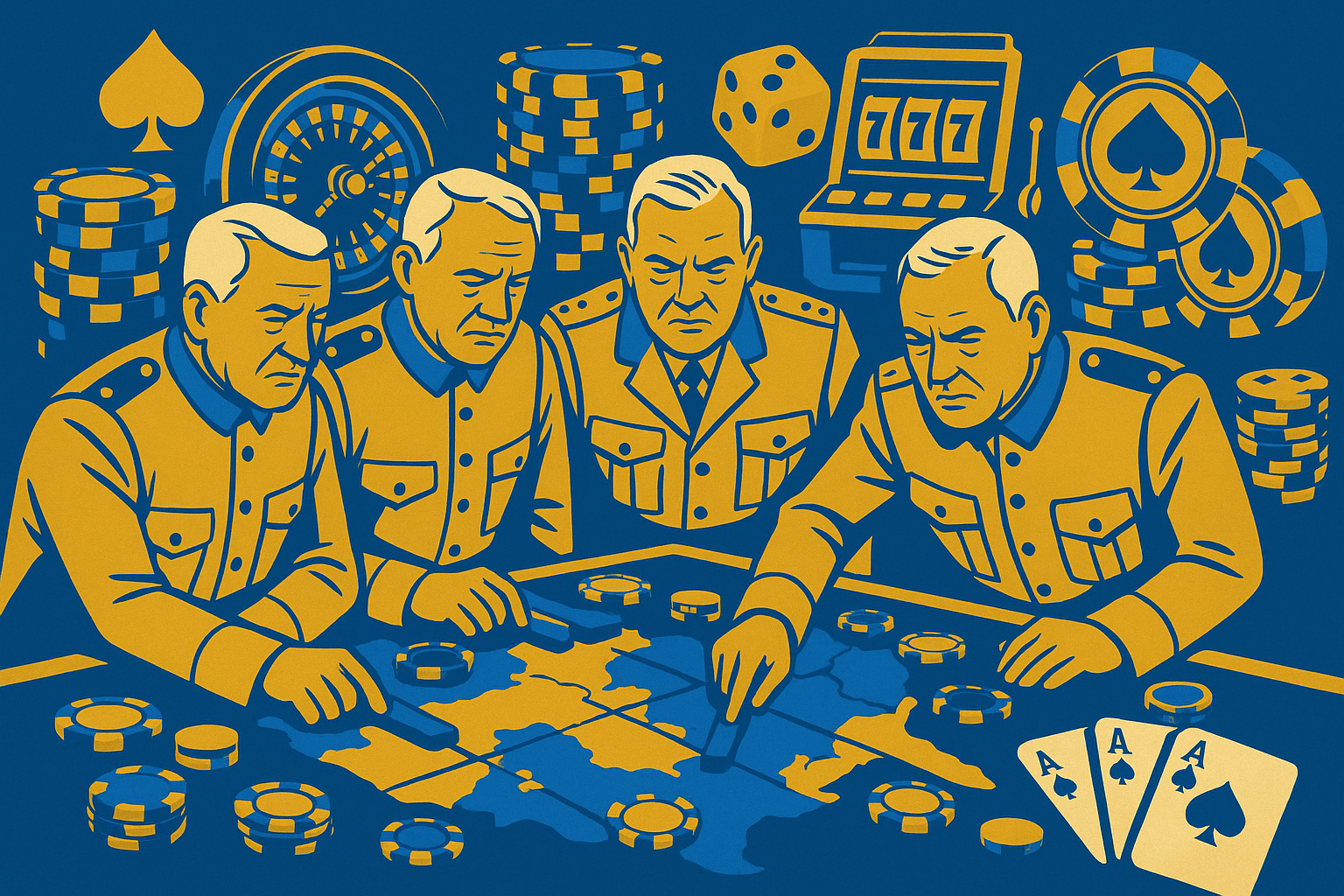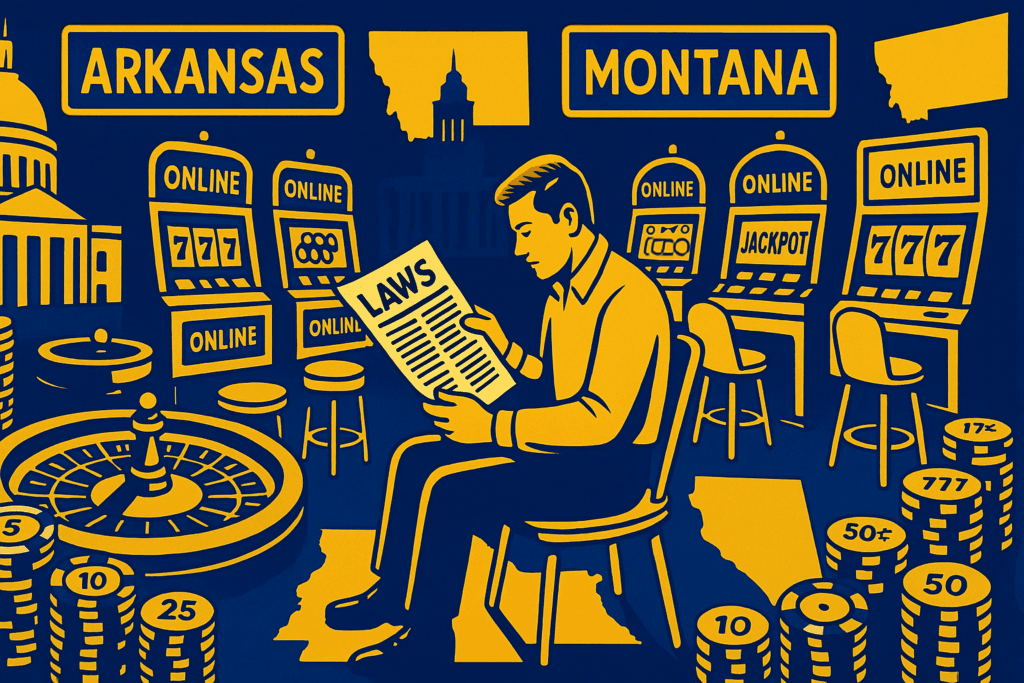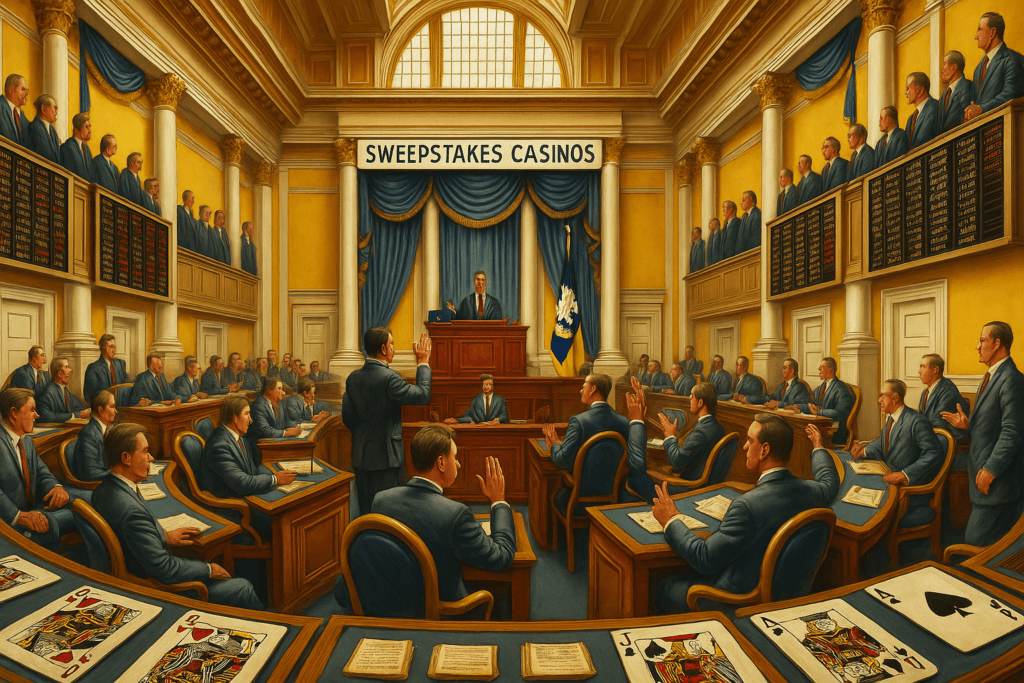A controversial gambling trend that was squashed in the 2010s could serve as legal precedent for lawmakers to ban or, at minimum, regulate sweepstakes gaming sites.
Remember internet cafes? Those little strip-mall storefronts where a customer could pay to use computers and access the internet? Also known as cybercafes, they were big in the 1990s and slowly faded over time as personal computers and wifi became things.
What you might not remember is that some of these internet cafes were … different.
What was a sweepstakes internet cafe?
These “sweepstakes internet cafes” would, like normal internet cafes, also sell products like internet usage or phone cards.
However, those purchases would also come with a certain number of free “entries” — 250 for a $2.50 purchase, for instance. A customer could then find out if any of those entries won them a cash prize by playing computer games that — yep, you guessed it — resembled online casino games. And that customer could also purchase more entries directly at the computer.
“Customers routinely spend several hours at a sweepstakes cafe,” reads a section of a 2014 white paper on internet sweepstakes cafes from the American Gaming Association. “ … Despite the cafes’ insistence that they do not offer gambling, some of their customers seek counseling to control their gambling at cafes, as reported by the Florida Council for Compulsive Gamblers.”
States cracked down on sweepstakes internet cafes in the 2010s. Ohio, Florida, and Mississippi banned them in 2013. So did California in 2014. Virginia, New Jersey, New Mexico, North Carolina, Massachusetts, Georgia, Connecticut, South Carolina, Louisiana, Pennsylvania, and Texas all took action against what they deemed illegal gambling in these internet cafes.
The retail version of sweeps sites? Or something different?
Today, stakeholders looking to curb the rapid spread of sweepstakes gaming sites have cited similarities between internet sweepstakes cafes of the 2010s and the sweeps gaming sites of today in several lawsuits.
“The gambling internet cafe operations have transitioned into calling the internet home,” reads one lawsuit filed against sweeps operator Pulsz in California.
Some similarities?
- Players on sweeps sites can purchase Gold Coins to acquire “free” Sweeps Coins, which they can use to play casino games for a chance to redeem the Sweeps Coins for cash. Customers at sweepstakes internet cafes bought products to acquire “free” entries that they would use to play casino games on a computer.
- Sweeps sites are not, and sweepstakes internet cafes were not, subject to any regulation in the U.S. They both don’t/didn’t pay gambling taxes on their revenues.
- Sweeps sites offer opportunities to get Sweeps Coins via mail-in requests. Sweepstakes internet cafes did the same thing for entries.
- Sweeps sites offer sign-up bonuses with extra “free” Sweeps Coins. Internet sweepstakes cafes would often give customers their first chunk of entries for free as an introductory promo.
And now the main difference:
- Sweeps gaming sites offer casino games that are based on chance or luck, similar to real-money games on online casino sites or their brick-and-mortar counterparts. In sweepstakes internet cafes, the customer’s winnings were already determined when they got their “free” entries with their purchase. The casino computer games simply revealed those winnings in a creative way.
Why you haven’t heard about this very much yet
Here’s what the Ohio Court of Appeals said when banning sweepstakes internet casinos:
“The justice system is not some lumbering oaf who must ignore the patently obvious gambling scheme apparent here simply because of a contrived separation between consideration and the scheme of chance.”
And this, from the South Carolina Attorney General way back in 2001:
“A gambling scheme cannot be transformed into legitimacy merely by splitting it into two parts.”
Yet, despite these bold statements against sweepstakes internet cafes, modern sweeps gaming sites are legal and thriving in Ohio, South Carolina, and all the states mentioned above.
Why haven’t we seen the same type of legal action taken against modern online sweeps operators?
First, these sweeps sites all have arbitration clauses in their terms and conditions. So, even if lawsuits from players spend a brief amount in the courts, those discussions tend to focus on whether that court even has jurisdiction to hear the lawsuit — not about the actual meat of the case.
Second, modern sweeps sites are making significant strides to promote safe and responsible gaming on their sites, far more than anything sweepstakes internet cafes ever attempted. In fact, the Social and Promotional Games Association, a gaming association built to advocate the sweepstakes industry, unveiled a Code of Conduct for its members in December that included things like age verification to limit purchases to those 18 and older, proper identify verification, and customer location verification.
Third, these sweepstakes sites — even if they’re similar to the sweepstakes internet cafes — are compliant with state laws for sweepstakes. So, although that doesn’t mean operators can’t also be violating a state’s completely separate gambling laws at the same time, sweepstakes compliance keeps them mostly in the clear.
AGA recommendations from 2018
That 2018 AGA white paper on sweepstakes internet cafes reached six conclusions that it claimed should shape public policy regarding the controversial cafes:
- Various courts across the U.S. ruled sweepstakes internet cafes offered illegal gambling.
- They faced no regulation and thus had no oversight on things such as game fairness, customer exclusion, and promotion of responsible gambling materials.
- They didn’t pay any tax on their gaming revenue.
- They were able to spread rapidly across the U.S. due to the limited barriers for entry and low cost to get off the ground.
- They were taking revenue away from other state-regulated gaming options like the lottery or retail casinos.
- They spent part of their revenue lobbying to keep their businesses legal, and some even remained operating despite state law deeming their business illegal.
“In these circumstances, the only responsible public policy is to enact and enforce effective prohibitions on this unintended sector of the gaming industry,” the white paper concluded.


